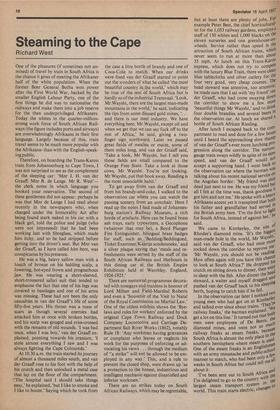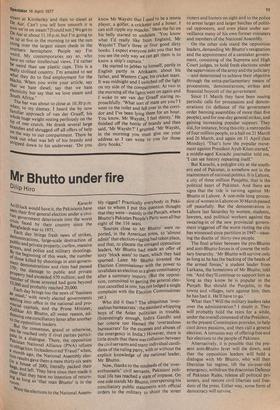Steaming to the Cape
Richard West
One of the pleasures (if sometimes not unmixed) of travel by train in South Africa is the chance it gives of meeting the Afrikaner half of the white population. When the former Boer General Botha won power after the First World War, backed by the smaller English Labour Party, one of the first things he did was to nationalise the railways and make them into a job reserve for the then underprivileged Afrikaners. Today the whites in the quarter-millionstrong work force of South African Railways (the figure includes ports and airways) are overwhelmingly Afrikaans in their first language. Largely because of this, train travel seems to be much more popular with the Afrikaansthan with the English-speaking public.
Therefore, on boarding the Trans-Karoo train from Johannesburg to Cape Town, I was not surprised to see as the complement of the sleeping car: `Mnr J. H. van der Graaff. Mnr R. de Lange. Mr R. West'— the clerk notes in which language you booked your reservation. The second of these gentlemen did not appear: perhaps he was that Mnr de Lange I had read about recently in the newspapers who, when charged under the Immorality Act after being found stark naked in his car with a black girl, told the police and judge (who were not impressed) that he had been working late with fibreglass, which made him itchy, and so he had stripped before getting into the driver's seat. But Mnr van der Graaff, as E have called him here, was conspicuous by his presence.
He was a big, heavy sallow man with a touch of bronze on his balding scalp, a lowering, hot-eyed frown and prognathous jaw. He was wearing a short-sleeved, short-trousered safari suit that tended to emphasise the fact that one of his legs was covered in bandages and one of his arms was missing. These had not been the only casualties in van der Graaff's life of some fifty-five years. His throat was a mass of scars as though several enemies had attacked him at once with broken bottles, and his scalp was gouged and criss-crossed with the remains of old wounds. `I was bad once, when I was boy,' van der Graaff explained, pointing towards his cranium, `I stole almost everything I saw and I was always fighting the Cape Coloureds.'
At 10.30 a.m. the train started its journey of almost a thousand miles south, and van der Graaff rose to his foot with the help of his crutch and then unlocked a metal case that lay on the floor of the compartment. 'The hospital said I should take things easy,' he explained, 'but I like to smoke and like to booze.' Saying which he took from
the case a litre bottle of brandy and one of Coca-Cola to match. When our drinks were fixed van der Graaff started to point out the wonders of what he called 'the most beautiful country in the world,' which may be true of the rest of South Africa but is hardly so of the industrial Transvaal. 'Look, Mr Waysht, there are the largest man-made mountains in the world,' he said, indicating the tips from some disused gold mines, `.. . and there is our steel industry. We have everything here, Mr Waysht, except oil and when we get that we can say fuck off to the rest of Africa,' he said, giving a twofinger sign, northward. Later we passed great fields of mealies or maize, some of them miles long, and van der Gra'aff said, 'Take a look, Mr Waysht, but I tell you those fields are small compared to the Orange Free State. Take a look at those cows, Mr Waysht. You're not looking. Mr Waysht, put that book away. Reading is the most unsociable habit.'
To get away froin van der Graaff and from his brandy-and-coke, I walked to the observation car where you can watch the passing scenery from an armchair. Here I read up the notes I had made of Johannesburg station's Railway Museum, a rich horde of artefacts. Here can be found brass ash trays, early typewriters, a Gecophone (whatever that may be), a Boyd Plunger Fire Extinguisher, bilingual brass badges for staff, such as 'Bedding/Beddingoed, Ticket Examiner/Kaartje sondersoeke,' and a silver plaque saying that `meals and refreshments were served by the staff of the South African Railways and Harbours in this dining car at the British Empire Exhibition held at Wembley, England, 1924-1925.'
There are memorial programmes decorated with nosegays and maidens in honour of Lord Milner and Field-Marshal Roberts and even a 'Souvenir of the Visit to Natal of the Royal Commission on Martial Law.' One of the oldest exhibits shows the 'Byelaws and rules for workers' enforced by the original Cape Town Railway and Dock Company Locomotive and Carriage Department Salt River Works (1862), notably Rule 18: 'Any workman having grievances or complaint who leaves or neglects his work for the purposes of enforcing or advocating his views. . . through the medium of "a strike" will not be allowed to be employed in any way.' This, and a rule to prevent the closed shop, were drawn up 'as a protection to the honest, industrious and intelligent mechanic against dissatisfied and inferior workmen.'
There are no strikes today on South African Railways, which may be regrettable,
Spectator 16 April 1971 but at least there are plenty of jobs. For example Peter Best, the chief horticultural' 1st for the 1,053 railway gardens, emploYs a staff of 150 whites and 1,000 blacks on the eleven nurseries and one greenhouse-onwheels. Service rather than speed is the attraction of South African trains, which never seem to run at more than about 35 mph. At lunch on this Trans-Karoo express, which does not try to comPete with the luxury Blue Train, there were clean blue tablecloths and silver cutlery for the four very good, very cheap courses. The head steward was attentive, too attentive; he made sure that I sat with 'my friend' van der Graaff, who had come swaying down the corridor to show me a few mot! 'beautiful things Mr Waysht,' and to driro` four double brandies and several beers in the observation car. At lunch we shared a bottle of South African Riesling. After lunch I escaped back to the corapartment to read and doze for a few hours until I heard the approaching slow thuMP of van der Graaff's ever more lurching Pro" gression along the corridor. The narroWgauge train sways wildly in spite of its slow speed, and van der Graaff would ncit accept a supporting hand. I went back to the observation car where the barman was talking about his recent national service on the Angolan border: 'My friend was shot dead just next to me. He was my friend but all I felt at the time was, thank goodness' got him and not me.' He spoke with a heavY Afrikaans accent yet it transpired that both his father and grandfather had served in the British army here. 'I'm the first to fight for South Africa, instead of against her,' he said. We came to Kimberley, the site °ft Rhodes's diamond mine. 'It's the bigges, man-made hole in the world, Mr WaYsht' said van der Graaff, who had once rnore rocked down the corridor to reprove me: `Mr Waysht, you should not be reading' How often again will you have this ehalce.s to look at South Africa?' He dropped "jt crutch on sitting down to dinner, then wend to sleep with the fish. After dinner the head steward, a waiter and myself dragged a.n„ pushed van der Graaff back to his sleePtIlb berth, hoping to catch him if he fell.
In the observation car later I noticed tW°
eye young men who had got on at Kimberi, and talked ever since about trains. `TheY r railway freaks,' the barman explained. " hoth get a lot on this line.' It turned out that men were employees of De Beers, the diamond mines, and were not sonnuuse railway freaks as steam freaks, heca,he South Africa is almost the only Place in southern hemisphere where steam is use,..,(1. One of the steam freaks is an EnglishT;" with an army moustache and public-sch_ew ° manner to match, who had been only a I _q
about it: m : South Africa but could tell
b e 41 and 'I've been sent out to South Africa the I'm delighted to go to the country wi the world. This train starts electric, changes tO
largest steam transport system in steam at Kimberley and then to diesel at be Aar. Can't you tell how smooth it is now we're on steam LI could not.] We get to be Aar at about 11.10 p.m. but I'm going to be up at five in the morning to see the sun rising over the largest steam sheds in the
s°uthern hemisphere. People say I'm weird ▪ . My contemporaries say so, who
be no other intellectual views. I'd rather
0e weird than use plastic cups. This is a really civilised country. I'm amazed to see What they do to find employment for the blacks. When you write your article, say that we hate diesel, say that we hate electricity but say that we love steam and South Africa.' The bar was about to close at 10.30 p.m. _When, to my dismay, I heard the by now familiar approach of van der Graaff, his Whole huge weight resting perilously on the t,_IP of one crutch, He drank several large brandies and shrugged off all offers of help on the way to our compartment. There he took out what was left of his brandy and stripped down to his underwear. 'Do you
know Mr Waysht that I used to be a tennis player, a golfer, a cricketer and a boxer. I can still ripple my muscles.' Here the fat on his belly started to undulate. You know what I'd really like from England, Mr Waysht ? That's three or four good dirty books. I expect everyone asks you that but you see the only way we can get them is to know a ship's captain.' He started to jabber to himself, partly in English partly in Afrikaans, about his father, and Western Cape, his cricket team. It was midnight and I switched off the light on my side of the compartment. At two in the morning all the lights went on again and I woke to see van der Graaff staring reproachfully. 'What sort of mate are you? went to the toilet and fell over in the corridor and I've been lying there for an hour. You know, Mr Waysht, I feel thirsty.' He finished off the bottle of brandy and then said, 'Mr Waysht?' I grunted. `Mr Waysht, in the morning you must give me your address so I can write to you for those dirty books.'







































 Previous page
Previous page